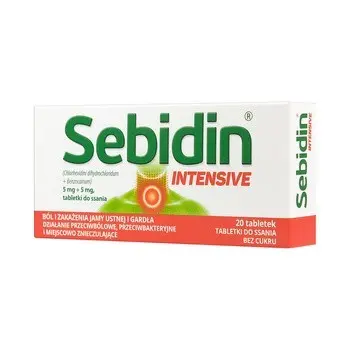Sebidin is a drug used in otolaryngology, family medicine and dentistry for the local treatment of pharyngitis and laryngitis. The preparation affects the respiratory system and digestive tract, has antifungal and bactericidal properties. Sebidin is available in tablet form and can be obtained without a prescription.
Sebidin (GlaxoSmithKline Pharmaceuticals SA – Polska)
| form, dose, packaging | availability category | the active substance |
| tabl. for suction (20 tablets) | OTC (over-the-counter) | ascorbic acid, chlorhexidine (ascorbic acid, chlorhexidine) |
Indications for the use of Sebidin
The active substances of Sebidin are ascorbic acid and chlorhexidine with antiseptic properties. The preparation is used in the local treatment of the symptoms of pharyngitis and laryngitis.
Dosage: Adults and children after the age of 12. Suck after a meal and brushing teeth 1 tablet. 4 × / d (every 6 hours). It is not recommended to rinse the mouth and drink plenty of fluids for 2 hours after using the drug. Due to the sucrose content, caution is recommended in diabetics and people prone to caries.
Sebidin and contraindications and warnings
Hypersensitivity to any of its ingredients is a contraindication to the use of the preparation.
Sebidin – warnings:
- In individual patients (with diseases of the gastrointestinal tract and liver), gastrointestinal disorders such as nausea, vomiting, belching, diarrhea may occur. In these cases, the use of the drug should be discontinued.
- The use of Sebidin may impair the sense of taste, which usually subsides 4 hours after use.
- Sebidin is recommended to be used after a meal and after cleaning the teeth. For 2 hours after using the drug, it is not recommended to rinse the mouth or drink plenty of fluids.
- If the symptoms worsen or do not improve after 3 days, contact your doctor. If your doctor recommends continuing treatment, you should not use the drug for more than 14 days without consulting your doctor again.
- Due to the sucrose content, caution is advised during administration to people with diabetes and a tendency to caries.
- Patients with hereditary problems of fructose intolerance, glucose-galactose malabsorption or sucrase-isomaltase insufficiency should not take this medicinal product.
- If you have the impression that the effect of the drug is too strong or too weak, consult your doctor.
- Ask your doctor for advice before using Sebidin during pregnancy or while breastfeeding.
Sebidin – interactions:
No drug interactions were found. Inform your doctor about all medications you have recently taken, even those sold without a prescription.
Sebidin – side effects:
Occasionally, allergic reactions (skin rashes and superficial exfoliation of the epithelium of the oral mucosa and swelling of the parotid glands occur rarely), irritation or inflammation of the oral mucosa. During long-term use, changes in the color of the teeth and tongue may occur, which may disappear spontaneously or must be removed by a doctor. In individual patients (with diseases of the gastrointestinal tract and liver), gastrointestinal disorders such as nausea, vomiting, belching, diarrhea may occur. In these cases, you should stop taking the drug. There may also be other side effects; inform your doctor about them.










